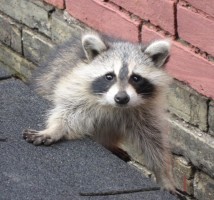
Four more raccoons have tested positive for rabies in Hamilton, bringing the total number of area cases to 10.
Six of those diseased raccoons have been found in Glanbrook, including two of the latest positive tests identified on the city’s public health update site Monday.
The other two new cases are identified as being in the east lower city. No humans have tested positive for the disease, which can be fatal if not treated before symptoms appear.
The outbreak has come as a surprise given no raccoons had tested positive for rabies in Ontario for a decade.
The Ministry of Natural Resources is spreading vaccine baits by air and by hand in a wide area stretching from North Burlington to Lake Erie to combat the outbreak.
Up to 185,000 baits are expected to be used by ministry workers before the end of the year.
Hamilton public health officials characterize the rabies outbreak risk to the public as “low,” but have posted a list of recommendations on how to keep people and pets safe.
What needs to be addressed is how the rabies virus has spread from Hamilton to Glanbrook.
Many people still believe that trapping nuisance wildlife and driving it to the country is the best way to solve conflicts. In fact, relocating wildlife is one method that should absolutely be avoided to help contain the spread of raccoon rabies.
“Urban raccoons typically have a very small range, usually no larger than a few city blocks. For the virus to be moving this far, this quickly it’s very likely that an infected raccoon was trapped in one area and relocated to another,” said Skedaddle Humane Wildlife Control CEO, Bill Dowd.
“Skedaddle Humane Wildlife Control has been preparing for rabies for over 20 years. We used to relocate mom raccoons but stopped to prepare for rabies. The industry followed, making trapping and relocating animals more than 1 kilometer illegal in Ontario. However, homeowners and some pest control companies still continue to relocate.”
Why trapping and relocating the raccoon is not the answer
- Trapping and relocating raccoons can contribute to the spread of the rabies virus. The raccoon you set loose, could be infected and now spread the virus to other wildlife in areas that were previously rabies-free.
- In Ontario, it is illegal to trap and relocate animals from the site where they were captured according to the Ministry of Natural Resources’ Fish and Wildlife Conservation Act
- You should avoid coming into contact with any wild animal, especially when there are active rabies cases. The disease could spread to you if you come into contact with saliva, blood, or get scratched or bitten.
- Live-trapping causes great stress for the trapped animal, and they may seriously injure themselves as they desperately attempt to escape. The saliva and blood may be infected, and will contaminate and infect anything the saliva or blood comes into contact with.
- Domestic animals and other wildlife may harass the trapped animal causing further stress or injury. If other wildlife comes into contact with the raccoon, and it is indeed infected with rabies or distemper, it could spread to the wildlife coming into contact with the caged animal
- Relocated animals are at an extreme disadvantage in a new environment. They have to find food, water and shelter in an unfamiliar territory. There may be territorial disputes between the relocated animal and resident animals that can lead to injury, and spreading diseases and viruses.
- Relocated animals may also spread disease to the resident wildlife population, therefore causing other animals to become ill and/or die.
- Improper use of a live trap, which results in animal suffering, could lead to animal cruelty charges through the Ontario SPCA Act.
Wildlife behavior is driven in large part by their need to food and shelter. Removing those attractants from your property is your best defense against raccoon intrusion.
Now that you know trapping is not the answer, and that it is unsafe to deal with wildlife on your own, hiring a professional wildlife control company is the next step.
What people should look for when hiring a wildlife control company?
- Experience- When dealing with unpredictable wildlife it’s important that your professional have the knowledge and experience to handle any potential scenario.
- Referrals- In the age of the internet, it’s easier than ever to find company reviews. Social media, Google and the Better Business Bureau are great places to start. Friends, family and co-workers can also help guide you in the right direction.
- Full Inspection- No two wildlife intrusions are the same. The species involved, time of year, den site location and numerous other factors will help play a role in determining the best course of action. It all starts with a thorough inspection of your home, including your roof and attic, for current and potential points of wildlife entry and damage.
In unvaccinated humans, rabies is almost always fatal after neurological symptoms have developed. Vaccination after exposure, post-exposure prevention, is highly successful in preventing the disease if administered promptly, in general within 6 days of infection.
With the cold weather upon us, raccoons will be trying to find a warm, secure place for the winter. Your chimney or attic may be prime location for them. If you suspect that your home or attic is home to raccoons that you should have them removed and excluded immediately by a professional.
All Skedaddle Humane Wildlife Control technicians have received rabies vaccinations and are trained in how to properly handle wild animals.
Call Skedaddle Humane Wildlife Control today: 1-888-592-0387.


